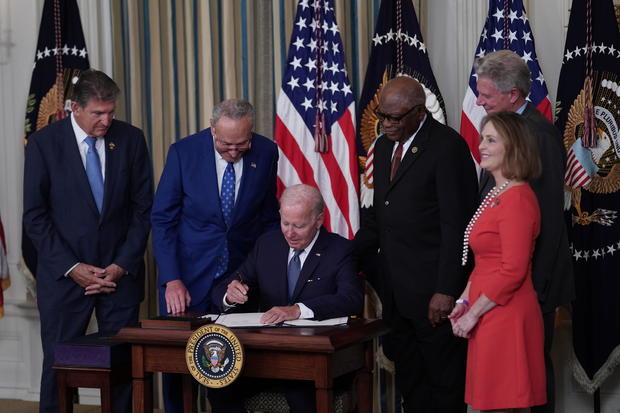Washington: President Biden signed Inflation reduction law Tuesday at the White House, finalizing a signature law aimed at fighting climate change, reducing health care costs and raising corporate taxes just weeks before the midterm elections.
The House and Senate passed the bill along party lines last week, after Democratic Sen. Joe Manchin and Senate Majority Leader Chuck Schumer reached an agreement after months of negotiations. Both senators were on hand for Tuesday’s signing ceremony.
“Let me say from the beginning, with this law, the American people won and the special interests lost,” Biden told the crowd gathered at the White House. The president had to silence cabinet members, members of Congress and staff in the audience as they continued to cheer and applaud after taking the lectern.
Passage of the bill was many months in the making and at times seemed unlikely with a 50-50 tie in the Senate and midterm elections looming. Achieve longstanding Democratic goals to lower prescription drug costs, invest in clean energy transitions, and reform the nation’s tax code.
“It was one of the few truly historic days in the 30 years I’ve been in Congress,” House Democrat Jim Clyburn said alongside Mr. Biden, praising the president’s legislative accomplishments.
Sarah Silbiger/Bloomberg via Getty Images
Senate Majority Leader Chuck Schumer said the legislation came amid “one of the most productive stretches in the history of the Senate,” in which Democrats passed gun control, Expansion of care for veterans exposed to burn pits and provided billions of dollars in subsidies to boost American semiconductor production. Schumer also praised the president for steering the Inflation Reduction Act through the finish line.
“I’m sure this bill will go down as one of the greatest legislative feats in decades,” Schumer said, adding that it was “the most important bill we’ve passed in a long time.”
Manchin, who sat in the front row of the room for the signing, received a standing ovation when Schumer thanked him for his role in passing the bill. The West Virginia Democrat had rejected earlier versions of the president’s Building Back Better agenda, but embraced the Inflation Reduction Act, which was much narrower in scope. The president handed Manchin his pen after signing the bill.
The announcement of a deal between Manchin and Schumer last month surprised many Democrats. Manchin explained to reporters Tuesday why he didn’t share how the deal worked earlier.
“I didn’t want anyone to be disappointed again because I didn’t think we could get there,” he said.
The new law provides $369 billion to finance energy and climate projects aimed at reducing carbon emissions by 40% by 2030, the largest investment in the fight against climate change ever. It will also cap out-of-pocket drug costs for seniors with Medicare at $2,000 a year and allow Medicare to negotiate with drug manufacturers on prescription prices.
The legislation sets a 15 percent minimum tax rate for most large companies and provides $80 billion in funding to the IRS, allowing the agency to hire thousands of agents and revamp decades-old technology systems.
The president signed the bill into law after returning from a vacation in South Carolina. First Lady Jill Biden tested positive for COVID-19 on Tuesday and will remain in South Carolina, but the president tested negative and returned to Washington. He is considered a close contact of the first lady.
In the coming weeks, the White House says the president will travel across the country to articulate how the bill will help Americans. It will also host an event celebrating the enactment of the bill on September 6.
Despite its name, how far the bill will go help reduce inflation remains to be seen. A Penn Wharton model says the bill won’t measurably affect inflation, and the Congressional Budget Office called the impact on inflation “negligible” this year before helping reduce inflation the subsequent years. Still, the White House points to a letter signed by more than 120 economists promoting the bill and insisting it will put “downward pressure on inflation by reducing the government’s budget deficit by about $300 billion over the next decade “.
A reporter noted to Manchin on Tuesday that the CBO doesn’t think the law will do much to reduce inflation.
“They haven’t always been right, I can tell you that,” he replied.
Republicans have pointed to models that suggest the law could suppress revenue slightly.
“With the stroke of a pen, Joe Biden will ensure that Democratic congressional races are over,” Republican National Committee Chairwoman Ronna McDaniel said in a statement. “Biden and the Democrats raised taxes on hardworking Americans and gave the IRS $80 billion to hire 87,000 new IRS agents. Americans will never forget that Biden and the Democrats raised taxes during a recession.”
[ad_2]
Source link






